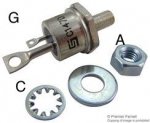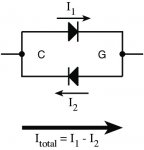- 1,311
- 1,687
- 113
- Location
- Basehor, KS
That’s an scr with one leg being the gate and the other two anode and cathode -Desoldere Q1. I got 167 across both legs. This diode has two legs unlike the others. If I did this right., then it's not blocking properly.
Completepowerelectronics.com Is For Sale
The domain name Completepowerelectronics.com is for sale. Call BuyDomains at 844-896-7299 to get a price quote and get your business online today!
www.completepowerelectronics.com




